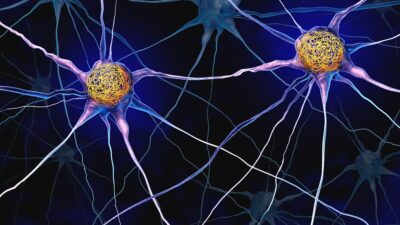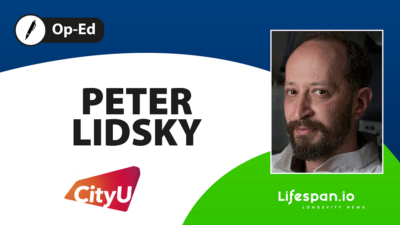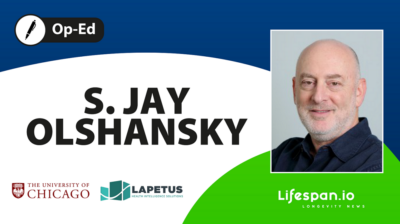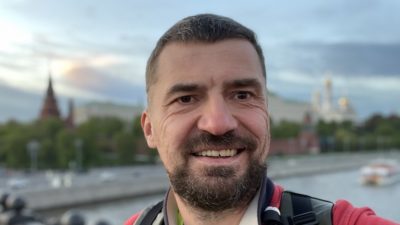
Category: Op-Ed

Is Aging Part of the Immune System?
What is aging? Sadly, we don’t know. If we ask the experts in the field, they will give us different answers [1]. Consensus has not been reached on even the

Playing the Long Game Towards Radical Life Extension
For most of the history of human civilization, humanity expanded at an astonishing pace: faster than exponential, nearly hyperbolic. This trend was famously described in a 1960 paper by Heinz

The Underexplored Applications of Longevity Biotechnology
No other human endeavor today holds more promise than understanding and targeting aging. The molecular mechanisms that drive aging impact overall vigor, environmental stress resistance, reproductive health, and broad disease

The Battle for Long Life Has Been Accomplished: What’s Next?
How long can people live? This is not just a foundational question in science. The answer has important public policy implications and is of interest to us all. Recent scientific

Is There a Single Essence of Aging?
In the Proceedings of the National Academy of Science, Dr. Jesse Poganik and Prof. Vadim Gladyshev of Harvard Medical School have presented an opinion proposing a consensus understanding of aging.

Longevity Will Become a Mainstream Part of Drug Development
Joppe Nieuwenhuis, Innovation Scout at Rejuveron Life Sciences, discusses his views about the future of longevity and rejuvenation research and how it will merge with current medical frameworks and systems.

An Open Access Research Tool for Lifespan Comparisons
Dr. Leon Peshkin talks us through a new open access research tool he has helped to develop. The Animal Life Expectancy Comparisons Research Tool (ALEC) is free for researchers to use

DunedinPACE – A Next Generation Epigenetic Aging Clock
With so many health and disease outcomes connected to the biological aging processes, research into quantifying and tracking aging has surged in recent years due to the work of Steve

Building Support for the War Against Aging
The life extension community has a number of long serving people in its ranks, and one of the longest-active of those in Russia is Mikhail Batin. His activities go way

The Senate Special Committee on Aging Needs Better Focus
The good news is that the United States Senate has a Special Committee on Aging. The bad news is that it has little to do with the actual processes of

Why Your Voice Matters for Longevity
Do members of Congress actually listen to the concerns of their constituents? Are the letters and emails you send read, or are they discarded into the physical or virtual trash?

Is Aging Part of the Immune System?
What is aging? Sadly, we don’t know. If we ask the experts in the field, they will give us different answers [1]. Consensus has not been reached on even the trivial definition of aging, let alone its primary mechanisms. But, can we cure aging without understanding

Playing the Long Game Towards Radical Life Extension
For most of the history of human civilization, humanity expanded at an astonishing pace: faster than exponential, nearly hyperbolic. This trend was famously described in a 1960 paper by Heinz von Foerster and colleagues, who extrapolated global population data to predict a so-called “Doomsday”, a demographic

The Underexplored Applications of Longevity Biotechnology
No other human endeavor today holds more promise than understanding and targeting aging. The molecular mechanisms that drive aging impact overall vigor, environmental stress resistance, reproductive health, and broad disease risk, and they fundamentally change what life means by radically changing our relationship to death. Intriguingly,

The Battle for Long Life Has Been Accomplished: What’s Next?
How long can people live? This is not just a foundational question in science. The answer has important public policy implications and is of interest to us all. Recent scientific evidence has revealed the answer, so what’s next in humanity’s never-ending battle against disease and the

Is There a Single Essence of Aging?
In the Proceedings of the National Academy of Science, Dr. Jesse Poganik and Prof. Vadim Gladyshev of Harvard Medical School have presented an opinion proposing a consensus understanding of aging. A problem of focus and funding The authors lament a lack of focus and funding in

Longevity Will Become a Mainstream Part of Drug Development
Joppe Nieuwenhuis, Innovation Scout at Rejuveron Life Sciences, discusses his views about the future of longevity and rejuvenation research and how it will merge with current medical frameworks and systems. About Rejuveron Rejuveron is a clinical-stage biotechnology company creating therapies to improve healthy aging. Its experienced

An Open Access Research Tool for Lifespan Comparisons
Dr. Leon Peshkin talks us through a new open access research tool he has helped to develop. The Animal Life Expectancy Comparisons Research Tool (ALEC) is free for researchers to use now. If a drug increases lifespan in mice by 15%, should I take it? The idea

DunedinPACE – A Next Generation Epigenetic Aging Clock
With so many health and disease outcomes connected to the biological aging processes, research into quantifying and tracking aging has surged in recent years due to the work of Steve Horvath, Morgan Levine, and others. Currently, epigenetic analysis of biological aging is thought to be the

Building Support for the War Against Aging
The life extension community has a number of long serving people in its ranks, and one of the longest-active of those in Russia is Mikhail Batin. His activities go way back to 2008 when the non-profit organization Science for Life Extension Foundation, which was first created

The Senate Special Committee on Aging Needs Better Focus
The good news is that the United States Senate has a Special Committee on Aging. The bad news is that it has little to do with the actual processes of aging and has not meaningfully furthered the research necessary to develop medical treatments for aging itself.

Why Your Voice Matters for Longevity
Do members of Congress actually listen to the concerns of their constituents? Are the letters and emails you send read, or are they discarded into the physical or virtual trash? If they are read, does it even make any difference? Popular belief would tell you that





